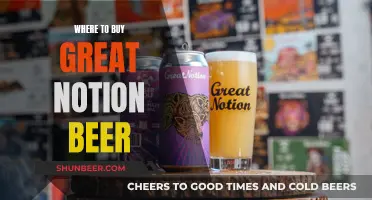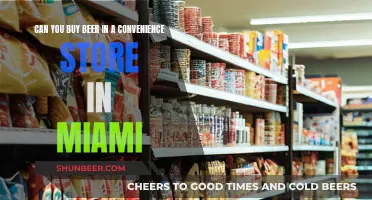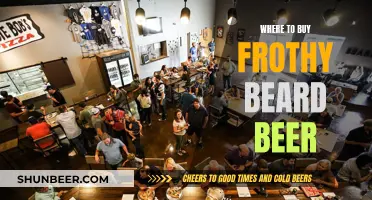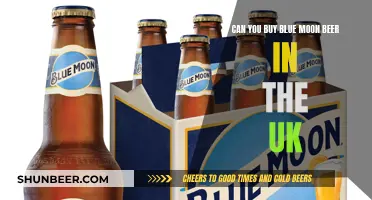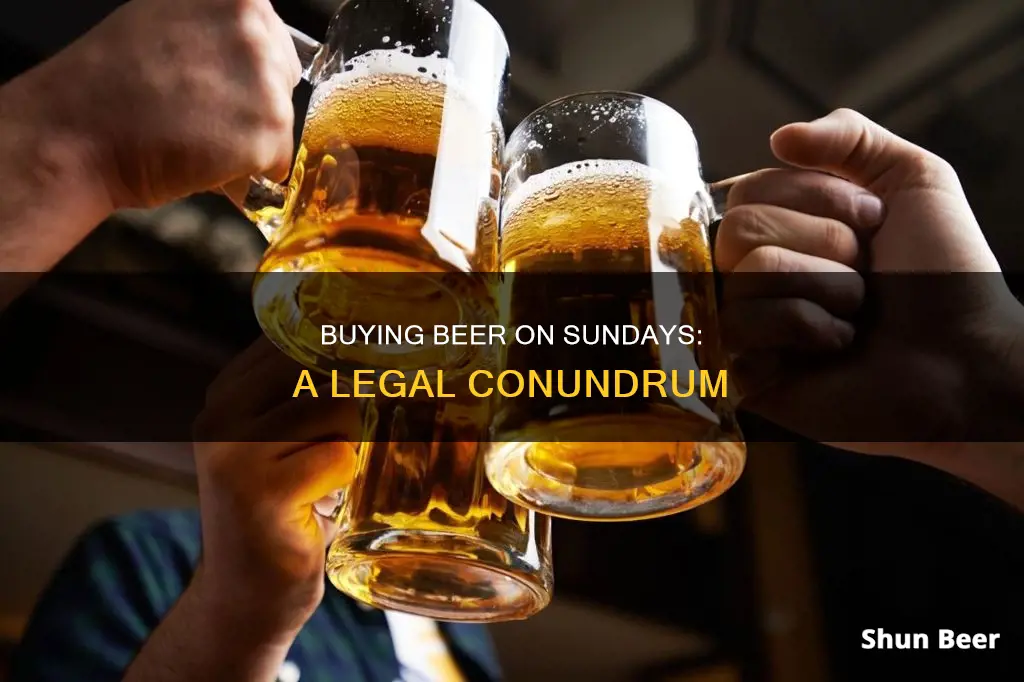
Depending on where you live, you may not be able to buy beer on a Sunday. These laws, known as blue laws, are in place to restrict certain activities on Sundays, or other specific days, for religious reasons. While blue laws may seem unconstitutional, the U.S. Supreme Court has ruled them constitutional, citing that they secure a day of rest for certain workers and guarantee the free exercise of religion.
| Characteristics | Values |
|---|---|
| Number of States with Blue Laws | 28 |
| Example States with Blue Laws | Arkansas, Delaware, Florida, Illinois, Indiana, Maine, Maryland, Massachusetts, Michigan, Minnesota, Mississippi, Nevada, New Jersey, New Mexico, New York, North Carolina, Oklahoma, Pennsylvania, Tennessee, Texas, Utah |
| Example Restrictions | Alcohol sales, car sales, hunting, grass watering, sex toy sales |
What You'll Learn
- Blue laws in the US restrict the sale of alcohol on Sundays
- In some states, alcohol sales are banned on Sundays and Christmas Day
- In some counties, alcohol sales are banned on Sundays
- Some states have repealed blue laws that prohibited alcohol sales on Sundays
- Some states have different laws for on-premise and off-premise alcohol sales on Sundays

Blue laws in the US restrict the sale of alcohol on Sundays
Blue laws, also known as Sunday laws, are laws that restrict or ban some or all activities on specified days, most often Sundays. These laws are in place in parts of the US, Canada, and some European countries. The US Supreme Court has held blue laws as constitutional, citing secular bases such as securing a day of rest for workers and guaranteeing the free exercise of religion.
Blue laws were originally designed to enforce the Christian Sabbath, but they have since come to serve secular purposes as well. While the historical roots of these laws are religious, they began to be challenged in the courts during the 1960s. The Supreme Court decided that Sunday laws were permissible but should be set at the state level.
In the US, blue laws usually restrict the sale of alcohol on Sundays, with many states continuing to impose tighter restrictions on the sale of alcoholic drinks. For example, in Massachusetts, bars are prohibited from promoting happy hours on Sundays, and in South Carolina, restaurants must obtain a special permit to sell alcohol on Sundays. Additionally, about half of Alabama's counties do not allow any alcohol sales on Sundays.
While blue laws regarding alcohol sales are becoming less common, with states rolling back restrictions every few years, they continue to be enforced in parts of the US.
Where to Buy Tooheys Beer in the USA
You may want to see also

In some states, alcohol sales are banned on Sundays and Christmas Day
In the United States, the sale of alcohol is prohibited on Sundays and Christmas Day in some states. These laws, known as "blue laws", are in place to restrict certain activities on Sundays and other specific days for religious reasons, mainly to observe a day of worship or rest. While blue laws may seem unconstitutional due to their religious basis, the U.S. Supreme Court has ruled them constitutional, citing that they secure a day of rest for certain workers and guarantee the free exercise of religion.
Blue laws vary by state, and different counties within those states may have their own laws. For example, in Arkansas, out of its 75 counties, 39 are "dry" counties, meaning the sale of alcohol is prohibited entirely. Alcohol sales are banned statewide on Christmas Day, and on Sundays in most counties. Indiana also restricts Sunday alcohol sales to between noon and 8 p.m. In Tennessee, alcohol cannot be consumed on-premise between 3 a.m. and 10 a.m. on Sundays, unless the local government has decided in favor of extended hours for alcohol sales, in which case sales before noon are prohibited.
Blue laws are not limited to alcohol sales. In Maine, for instance, it is illegal for almost all businesses to be open on Thanksgiving, and hunting is prohibited on Sundays. In Maryland, professional sports games are restricted to before 1 p.m. on Sundays.
Over time, blue laws have been gradually repealed in many states, and restrictions have been loosened in others. For instance, in Connecticut, the ban on selling alcohol on Sundays was repealed by the state legislature in 2012. Tennessee also began to allow stores to sell wine on Sundays in 2018, recognizing that Sunday was "the biggest shopping day of the week".
Bissell Brothers Beer: Now Available at RSVP
You may want to see also

In some counties, alcohol sales are banned on Sundays
The specifics of blue laws vary by state and county. For example, in Arkansas, 39 out of its 75 counties are "dry", meaning the sale of any alcoholic beverage is prohibited entirely. Alcohol sales are also prohibited on Sundays in most Arkansas counties. In Indiana, Sunday alcohol sales are restricted to between noon and 8:00 PM. In Tennessee, alcohol cannot be consumed on-premise between 3:00 AM and 10:00 AM on Sundays, unless the local government has decided in favor of extended hours.
Blue laws have been slowly fading away, with more states rolling back restrictions every few years. For instance, Connecticut repealed its ban on selling alcohol on Sundays in 2012, and Tennessee began allowing wine sales on Sundays in 2018. However, until a state or county repeals its blue laws, residents must plan ahead if they wish to purchase or consume alcohol on Sundays.
Buying Beer: Location-Based Availability and Restrictions
You may want to see also

Some states have repealed blue laws that prohibited alcohol sales on Sundays
Blue laws, also known as Sunday laws, are laws that restrict or ban certain activities on specified days, most often Sundays. These laws are in place to promote the observance of a day of rest and are often rooted in religion, particularly the Christian sabbath. While blue laws are enforced in parts of the United States, Canada, and some European countries, they have been met with criticism and legal challenges over the years.
In the United States, blue laws have been gradually repealed or struck down by state courts. As of early 2023, the number of states with blue laws related to alcohol has been shrinking. Several states, including Connecticut, Delaware, Minnesota, Arizona, and the District of Columbia, have repealed their blue laws prohibiting alcohol sales on Sundays.
Connecticut, for example, lifted its ban on selling alcohol on Sundays in 2012. Similarly, Arizona repealed its law that limited alcohol sales hours on Sundays in 2010. The District of Columbia also joined this trend in 2013, allowing liquor stores to remain open on Sundays.
Other states have made strides towards relaxing their blue laws pertaining to alcohol sales. Tennessee, recognizing that Sunday is a prime shopping day, began allowing stores to sell wine on Sundays in 2018. Texas is also working on loosening its blue laws related to alcohol sales.
While the number of states with blue laws is declining, there are still some states that uphold these restrictions. Notably, Oklahoma and most of Mississippi prohibit the sale of alcohol on Sundays. Additionally, about half of Alabama's counties do not permit the sale of alcohol on Sundays.
The evolution of blue laws in the United States reflects a shift in societal norms and legal interpretations. While the Supreme Court has upheld the constitutionality of blue laws, citing secular justifications, the laws continue to be challenged and repealed in various states, granting residents more flexibility in their purchasing decisions on Sundays.
Buying Beer in the Morning: Is It Possible?
You may want to see also

Some states have different laws for on-premise and off-premise alcohol sales on Sundays
In the United States, the Twenty-first Amendment grants each state and territory the power to regulate intoxicating liquors within their jurisdiction. As a result, laws pertaining to the sale and consumption of alcohol vary significantly across the country.
For example, in Alabama, on-premise and off-premise liquor sales are limited to 2:00 AM on Sundays, but beer and wine can be sold in supermarkets, while spirits cannot. Arkansas has similar restrictions, with on-premise sales allowed until 2:00 AM and off-premise sales prohibited after midnight on Saturdays. Beer and wine can be sold in supermarkets, but only in-state-produced wine is permitted, and spirits are prohibited altogether.
In contrast, California allows alcohol sales from 6:00 AM to 2:00 AM daily, with no distinction between on-premise and off-premise sales. Wine, beer, and spirits are permitted to be sold in grocery stores, and counties can implement additional restrictions through local laws.
The state of Washington also has uniform hours for on-premise and off-premise sales, with alcohol sales permitted from 6:00 AM to 2:00 AM daily. Beer and wine can be sold in specialty stores, grocery stores, convenience stores, and some larger retail shops, while spirits are only available in state-run liquor stores.
These variations in state laws demonstrate the diverse approaches to regulating alcohol sales in the United States, particularly regarding on-premise and off-premise consumption on Sundays.
Legal Drinking Age: Beer Buying Restrictions and Limits
You may want to see also
Frequently asked questions
Depending on where you live, your state or county may have what are known as "blue laws", which restrict certain activities on Sundays, such as the sale of alcohol.
Blue laws are laws that restrict or ban some or all activities on specified days, most often Sundays. They are in place to promote the observance of a day of rest and are based on religious reasons.
Blue laws were introduced by Puritans in colonial times to prohibit certain activities on the Sabbath.
Yes, as of 2024, 28 states in the US still have some form of blue laws. However, they are slowly fading away, with more states rolling back restrictions every few years.
Blue laws vary depending on the state and county you're in. For example, in Massachusetts, bars are prohibited from promoting happy hours on Sundays, whereas in South Carolina, restaurants need a special permit to sell alcohol on Sundays. In Texas, car dealerships must close on either Saturday or Sunday, and it's up to them to decide which day.



